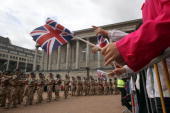 Earlier this week, James lent his voice to those who want to grow the British army. The British army currently consists of around 98 000 regular soldiers and 34 000 territorial army soldiers taking its size is about 132 000. but this has not proven adequate to deploy anything near enough troops in Helmand or even Basra.
Earlier this week, James lent his voice to those who want to grow the British army. The British army currently consists of around 98 000 regular soldiers and 34 000 territorial army soldiers taking its size is about 132 000. but this has not proven adequate to deploy anything near enough troops in Helmand or even Basra.
But I nonetheless remain a little weary of the proposal. Growing the army will not help the situation in Helmand. The lag time for recruitment, training and deployment means that new forces would be available far too late – perhaps only in five years — to ease the stresses now facing British forces. Though I, like James, believe the mission to be critical I hope that in five years we have moved from a phase of fielded forces to a phase characterized by mentoring and supporting the local security forces. This will still require a serious footprint, but not necessarily a bigger army
My biggest concern, however, is different. There will always be a military component to counter-insurgency. But as the government makes clear all the time, the primary role in counter-insurgency belongs not to the military but to the civilian departments, the FCO and DfiD. I think it is important the government creates PeaceCorps-style organizations so that many of the tasks now undertaken by the army can be done by civilian experts. This in itself will cost a lot and is much harder to set up than growing the army, so I worry that army expansion would preclude this vital reform.






Comments